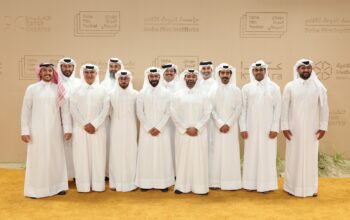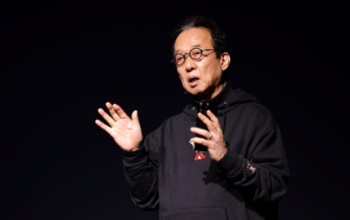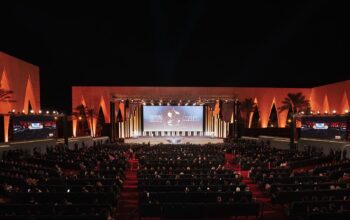Locarno – Raghda Safwat
After her last feature, MEDITERRANEAN FEVER, won the Best Screenplay Prize of Un Certain Regard of Cannes Film Festival 2022, Palestinian filmmaker Maha Haj managed to back to big races with her “UPSHOT”, a poignant Palestinian short film about human loss and resilience, which been selected for the 77th Locarno International Film Festival, competing in the Pardi di Domani – Corti d’Autore Competition.
Set against the backdrop of Gaza’s enduring strife, UPSHOT is a gripping drama brought to life by a starry cast headlined by Mohammed Bakri, Areen Omari, and Amer Hlehel. It tells the story of Suleiman and Lubna, a couple who retreat to a mist-shrouded, isolated farm as they try to cope with unspeakable loss. Through the alchemy of storytelling, Suleiman and Lubna conjure a parallel reality free of their pain in which their lives unfold in vivid detail. But when a journalist intrudes upon their sanctuary, wielding the blunt force of truth, the fragile illusion they’ve constructed threatens to unravel.
UPSHOT is a joint production between Palestine, Italy, and France, and is produced by Ramallah-based company August Films with Hanna Atallah and Ronza Kamel — the two of which are also co-producing THANK YOU FOR BANKING WITH US, which is in post-production and, like UPSHOT, will be distributed worldwide by MAD World and in all Arabic-speaking territories by MAD Distribution.
UPSHOT is both a lamentation and a testament to the indomitable power of the human spirit,” says Haj. “In a world defined by suffering, Suleiman and Lubna’s journey is a poignant reminder of the boundless resilience of the human imagination. With a narrative set in the future, this film confronts the stark reality of a nation scarred by decades of conflict. There are no easy answers, no political solutions to assuage the anguish of parents who have lost everything. And so, it unfolds in a realm unbound by time or place — a poignant reflection of the irreparable loss that defies earthly confines”.
Haj has achieved with each new film of hers.. breaking through the world, and an unending adherence to the cause and an obsession with cinema that precedes all her motives.. In a discussion about her film in Locarno, we touched on many topics in which Al-Hajj declared herself as a frank and self-reconciled person, possessing an abundance of courage higher than expected from a filmmaker, and no less than the courage of all her citizens.
Maha Haj : Cinema is a reflection of what a person has of individual personal culture
First, how would you describe processing such a project in short time to catch up with Locarno’s ?
I wrote the film in June 2023 and started filming by January of this year, giving all the crew enthusiastic, We wrapped filming only in five days, and all the post production by end of March.
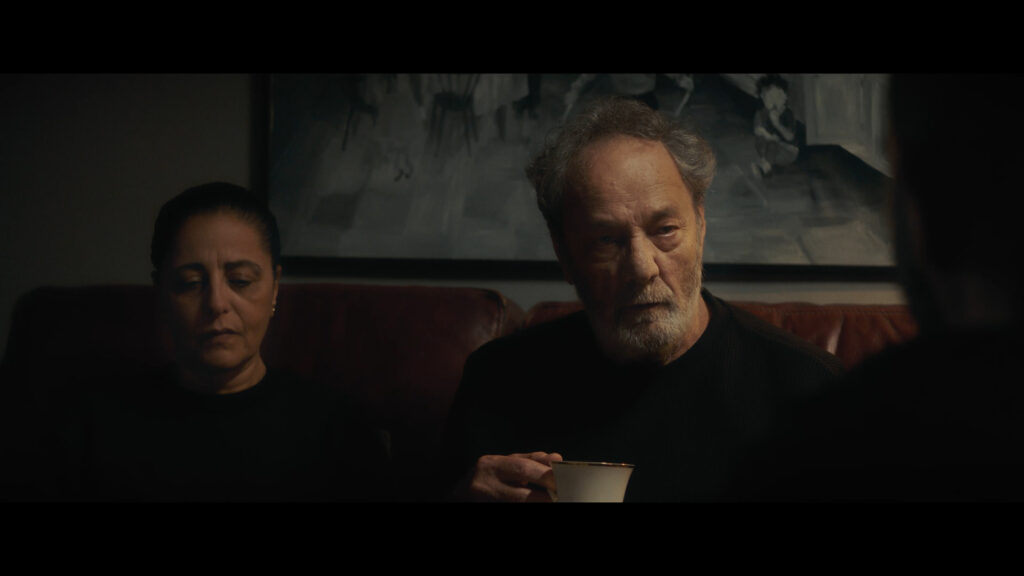
As a self-taught filmmaker, what were your influences when you started to learn the medium?
I always thought My passionate about cinema would be enough to write and direct. It was almost accidental that I became a filmmaker, out of curiosity. I started making films. My influences were mostly literary, but coming into film I learned from seeing films, and I saw everything.
But my entry into filmmaking really was a late result for a long life dream, as I directed my first feature film when I was forty-five. Then passion about telling the story, that gave me the keys to unlock the door to cinema. I believe I am the best one to script write my own story, and writing gives me a special kind of pleasure. When I finish preparing the script and hear praise and compliments about it, I feel the value of that work. Writing is a difficult hobby, but the result is very satisfying because I saw the steps of this project’s growth myself. I ended up feeling fulfilled and accomplished for what it eventually became.
Maha Haj : I don’t do commercial cinema
How could you promote your films to match the top film festival’s agenda ?
My films certainly have a strong political aspect, but politics is in the background. I cannot describe any of them as a political film. Rather, each film is a Palestinian film that raises global awareness. The last film I told its message through human stories of people living under the control of the occupation, but who happened to have other concerns that they may share with the rest of the world. if I talk more precisely about my cinema, I do not direct commercial cinema, and I do not aim to make a film for the purpose of selling, also never concerned about what festivals like or reject.. I make films that I love to watch as an audience in the first place.
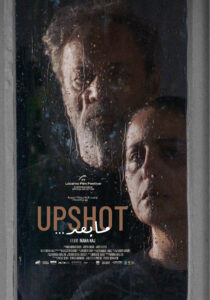
Maha Haj : my cinema doesn’t target the ignorant
Funding for Palestinian films has been controversial in the last few years. Since you have a different experience with your first film, which was co-produced by Israel,to what extent do you see the policy of benefiting the sources supplies and authority of the occupation as more beneficial than a total boycott?
Mentioning my own experience, The funding for Personal Affairs came from the Israel Film Fund. Before anyone could contribute to funding the film, they want you to first get funding from your country. This was my first feature film and foreign investors and producers had no reason to invest in me. I knew early on that this wouldn’t please many people and that it wouldn’t receive support from Arab countries, but at the same time I was trapped between two clear choices: either to make my film with this Israeli fund or not to present my first film at all, nor any other films even after it. I decided to choose funding and went on a journey with the film to explain the why would Palestinian film defined as an Israeli, especially since 2014 law requires that a film be defined as Israeli if its production company is Israeli, regardless of its makers, author, director or crew. later i produced the second film which had good chances to receive different funding, in addition to better luck in sales and distribution, and also the film was identified as Palestinian, which was something very important to me. At that time, I felt that I had passed this stage and I did not have to return to it ever, now I have my name and the road is open for me.
When you received this fund from an Israeli party.. Did they have any reservations about the subject of the film or asked to change its treatment?
No, there were no reservations.
Can any Israeli party support a film or cinema project that supports the cause? Does this exist and is it real?
Of course, part of the Israeli film funds support, but the support is to a certain extent, of course, and I believe that the situation today has changed from what it was 8 years ago, and the change depends on the governments and their political positions.
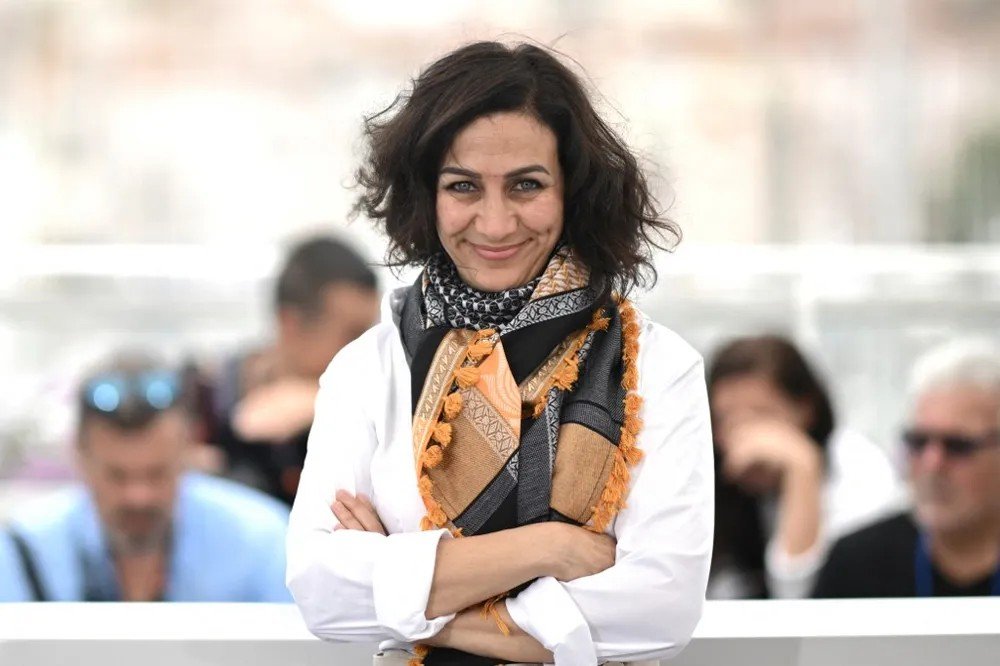
Maha Haj : Comedy is what saves us from reality
All your choices speak of your personal tendency to adventure.. You took big risks like greeting Shireen Abu Akleh on Cannes Film Festival stage.. Are there any adventures that you have taken before and then reviewed yourself?
Never, I have never felt regret or reviewed myself, even when years pass and I discover that there is an old failed decision, I do not regret, everything I go through teaches me a lot and I mature and become wiser, and all unsuccessful experiences contain a lesson. And when I was greeting Sherine’s spirit, I felt what I said spontaneously without thinking about what would happen tomorrow. At that time, I had a feeling of anger, sadness and condemnation, and my admiration for her and my sense of responsibility towards honoring her, and my presence on a bright platform, all of this made me feel that I had to mention Sherine’s name, and I did not care what would happen tomorrow.
If we talk about the West’s view of Arabs.. How can the Arab filmmaker change the cliché ideas about Arabs? Have you thought about targeting this in any of your films.. since you are basically targeting Western viewers and international festivals?
When I write, I don’t think about what the audience who will attend the film is thinking, and I am not concerned with the issue of changing their point of view about us or their “stereotype”, I only think about the story! And my devotion is entirely to the story and the characters that I pursue with all my feelings and all the concerns inside me, unlike the fact that if we look at the clichés in their ideas about us, we will find that most of their imaginations reflect ignorance, and I do not target the ignorant with my art! When I tell a story in a film, I do not try to convince the Western audiEnce that we are human beings like them, that does not concern me! Let them see what they sees, this is our life. This is our reality as I present it in my films. Other than that, as Arabs, we do not need to convince the West that we are open, educated and cultured, we have all sects and classifications. The Arab world is not a village, the Arab world is like any other place in the world, it has something of everything, and as a filmmaker, I do not see it as part of my duties to correct misconceptions. My films present the truth about the Arab. The Arab is a cultured person. He loves, suffers, gets depressed, dreams, dances and learns. He is a human being like any other human being.
In a related context, I do not see that we resemble the West, but we are different from the West. We have our authenticity, our components, our features, our heritage and our morals. We are not trying to be like them, and my goal is not to show them that we are like them.
Maha Haj : I have experience with depression, but I’m not depressed now
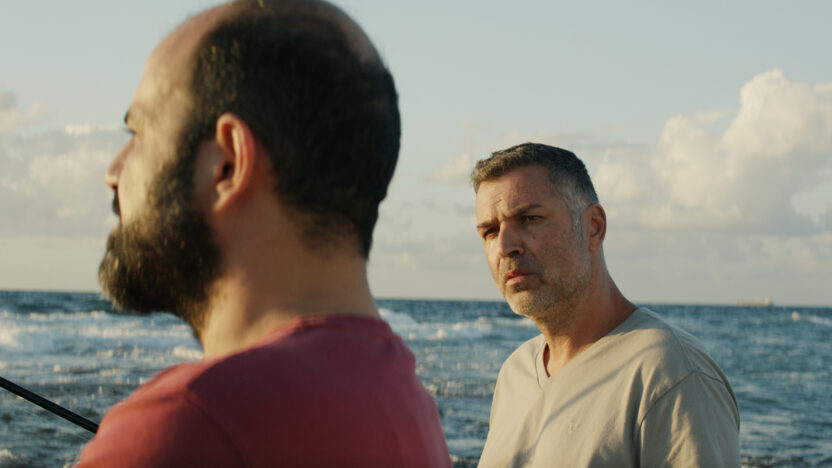
Back to “Mediterranean fever” .. Making a film about depression is definitely backed by a director who has experience with depression..
Of course I have experience with depression, but when I worked on the film I did not search on Wikipedia or sit with a psychiatrist, but I went through all of this and I have personal experience with depression.
don’t you think that would cost the director going through depression again ?
Currently I am not depressed, thank God, and the surprising thing is that when I started writing the film I felt that I was treating myself, my feelings became better after I wrote it all, Walid’s story is not my story, but writing about feelings that I know well, was a kind of disclosure and venting. And when I turned these feelings into an artistic work, I felt that I inhaled a long and comfortable breath.
You defined yourself before as a melancholic director. Don’t you think that making gloomy films deprives them of mass circulation?
first, the gloomy that I tend towards in cinema is not direct gloomy, it is mixed with sense of humor, i believe that comedy is what saves us from reality, and sarcasm in general is a characteristic of the Palestinian people. deals with life in a sarcastic manner. That makes it easier for me to go through with life. The characters in my films resemble me, and I live through some of their experiences. Sarcasm could be therapeutic at times!
Second, when I write, I only think about the story and how to tell it and how to reach my passion to people, I don’t think about who the audience is or how old they are or what their psychological and economic state is, I also don’t think about who will watch the film whether it is critics or an ordinary audience.
Would you tell us about last film you watched and liked?
The Zone of Interest, won the Oscar, it’s a wonderful film.
About Maha Haj
Maha Haj was born in Nazareth breaking into cinema with a diverse background in English and Arabic literature. A graduate of the Hebrew University of Jerusalem, she weaves her profound understanding of storytelling into each frame. After making her mark as an artistic designer on renowned productions such as THE ATTACK by Ziad Douairi and ON THE HILL by Rafael Natjari, she made her directorial debut in 2009 with the short film ORANGES, followed by the poignant documentary BEHIND THESE WALLS in 2010.
Her first foray into feature filmmaking came in 2015 with PERSONAL AFFAIRS — a critically acclaimed work that was also selected for Un Certain Regard in the 2016 edition of the Cannes Film Festival. MEDITERRANEAN FEVER followed up its success at Cannes in 2022 with an extended festival tour that included Edinburgh, Chicago, Palm Springs, Sydney, Melbourne, Sarajevo, Vancouver, Goa, Sao Paolo, Sevilla and Rotterdam international film festivals. The film won the Student Jury Prize at Tokyo FILMex and a Golden Firebird for Young Cinema at the Hong Kong International Film Festival. It was also Palestine’s official submission for Best International Feature Film at the Academy Awards the following year.
Published on: Aug 15, 2024 at 15:51

